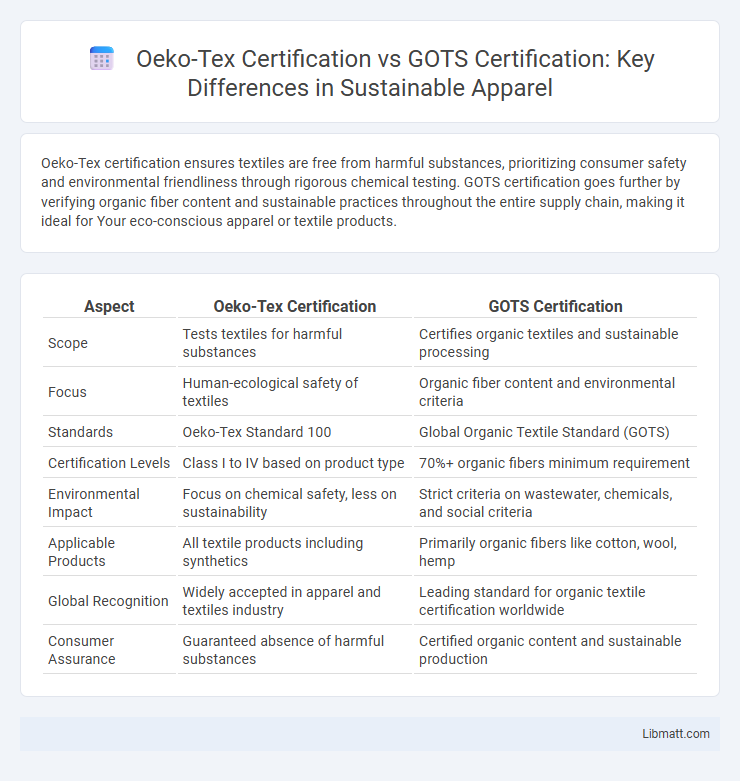Oeko-Tex certification ensures textiles are free from harmful substances, prioritizing consumer safety and environmental friendliness through rigorous chemical testing. GOTS certification goes further by verifying organic fiber content and sustainable practices throughout the entire supply chain, making it ideal for Your eco-conscious apparel or textile products.
Table of Comparison
| Aspect | Oeko-Tex Certification | GOTS Certification |
|---|---|---|
| Scope | Tests textiles for harmful substances | Certifies organic textiles and sustainable processing |
| Focus | Human-ecological safety of textiles | Organic fiber content and environmental criteria |
| Standards | Oeko-Tex Standard 100 | Global Organic Textile Standard (GOTS) |
| Certification Levels | Class I to IV based on product type | 70%+ organic fibers minimum requirement |
| Environmental Impact | Focus on chemical safety, less on sustainability | Strict criteria on wastewater, chemicals, and social criteria |
| Applicable Products | All textile products including synthetics | Primarily organic fibers like cotton, wool, hemp |
| Global Recognition | Widely accepted in apparel and textiles industry | Leading standard for organic textile certification worldwide |
| Consumer Assurance | Guaranteed absence of harmful substances | Certified organic content and sustainable production |
Overview of Oeko-Tex and GOTS Certifications
Oeko-Tex Certification ensures textiles are free from harmful substances by testing for chemicals and allergens, focusing on product safety for consumers. GOTS Certification emphasizes organic fiber content and sustainable production practices, covering the entire supply chain from cultivation to manufacturing. Your choice between these certifications depends on whether you prioritize chemical safety (Oeko-Tex) or organic and environmental standards (GOTS).
Key Objectives of Oeko-Tex Certification
Oeko-Tex Certification aims to ensure textiles are free from harmful substances that pose risks to human health, focusing on testing thousands of chemicals in materials, threads, and accessories. It guarantees consumer safety by setting strict limits on pollutants and allergens, making it a critical standard for product safety in the textile industry. This certification supports sustainable textile production by promoting environmentally friendly processes and increasing transparency in the supply chain.
Core Principles of GOTS Certification
GOTS Certification centers on stringent ecological and social criteria, ensuring organic fiber content, sustainable processing, and fair labor practices throughout the textile supply chain. It mandates transparency in chemical use, wastewater treatment, and worker safety, surpassing basic environmental standards. GOTS' holistic approach makes it a benchmark for sustainable textile production, emphasizing both product quality and corporate responsibility.
Chemical Safety Standards: Oeko-Tex vs GOTS
Oeko-Tex Certification emphasizes rigorous testing for harmful substances, ensuring textiles meet strict chemical safety standards by screening for over 100 regulated and non-regulated chemicals, including pesticides, heavy metals, and allergens. GOTS Certification goes beyond chemical safety by enforcing ecological and social criteria throughout the entire organic textile supply chain, restricting the use of toxic chemicals and mandating biodegradable detergents and auxiliaries. Your choice between Oeko-Tex and GOTS Certification depends on whether you prioritize comprehensive chemical safety testing or a holistic approach including organic fiber content and sustainable processing methods.
Environmental Impact and Sustainability
Oeko-Tex Certification ensures textiles are free from harmful substances and verifies eco-friendly production processes, promoting healthier environmental standards. GOTS Certification goes further by encompassing the entire supply chain, including organic fiber content, sustainable farming practices, and social criteria, resulting in a comprehensive approach to environmental impact and sustainability. Your choice between these certifications depends on whether you prioritize chemical safety with Oeko-Tex or a holistic commitment to organic and social sustainability with GOTS.
Social and Ethical Requirements Compared
Oeko-Tex Certification primarily focuses on testing textiles for harmful substances to ensure consumer safety, with limited social and ethical requirements embedded in its standards. GOTS Certification emphasizes stringent social and ethical criteria, mandating compliance with fair labor practices, workers' rights, and environmental sustainability throughout the entire organic textile supply chain. Brands seeking comprehensive social responsibility and ethical sourcing typically prioritize GOTS Certification for its robust oversight and transparency in worker welfare and environmental impact.
Scope of Certification Across the Textile Supply Chain
Oeko-Tex Certification covers harmful substances testing throughout various stages of the textile supply chain, including raw materials, intermediate, and end products, ensuring consumer safety and environmental health. GOTS Certification offers a comprehensive scope with strict organic fiber standards and encompasses ecological and social criteria across the entire textile supply chain from harvesting raw materials to manufacturing and labeling final products. Your choice between Oeko-Tex and GOTS certification depends on whether you prioritize chemical safety or organic and social responsibility standards throughout the supply chain.
Labeling and Consumer Transparency
Oeko-Tex Certification ensures textiles are free from harmful substances, providing clear labeling that communicates product safety to consumers. GOTS Certification goes further by verifying organic fiber content and environmentally friendly processing, delivering comprehensive transparency on ecological and social standards. Your choice between these labels influences how much information you receive about sustainable practices and chemical safety in textile products.
Global Recognition and Industry Adoption
Oeko-Tex Certification is globally recognized for ensuring textiles are free from harmful substances, widely adopted in industries prioritizing safety and consumer health. GOTS Certification holds significant global prestige for organic textile production, emphasizing environmental and social criteria, favored by sustainable fashion and eco-conscious brands. Your choice between these certifications depends on whether your focus is on chemical safety standards or comprehensive organic and ethical production validation.
Choosing Between Oeko-Tex and GOTS for Your Products
Choosing between Oeko-Tex and GOTS certification depends on your product focus and sustainability goals, as Oeko-Tex primarily ensures textiles are free from harmful substances, while GOTS certification covers organic fiber content and strict environmental and social criteria throughout the entire supply chain. Oeko-Tex is ideal for products requiring chemical safety verification, whereas GOTS suits brands committed to organic production and ethical manufacturing practices. Evaluating factors such as material type, consumer expectations, and certification requirements will guide your decision for eco-friendly textile certification.
Oeko-Tex Certification vs GOTS Certification Infographic

 libmatt.com
libmatt.com